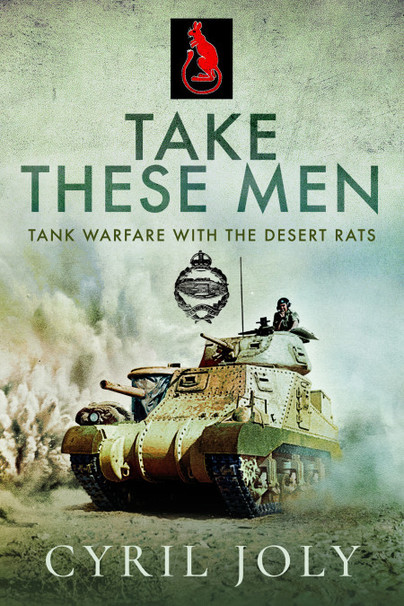
Take These Men: Tank Warfare with the Desert Rats. By Cyril Joly. Pen and Sword, Barnsley, 2019 reprint of 1955 classic
Reviewed by Gregory P. Gilbert
‘Take these men for your example. Like them remember that prosperity can only be for the free, that freedom is the sure possession of those alone who have the courage to defend it.’ Pericles
THERE are many memoirs written by those who served in World War II and while many of these are still of interest after seventy-five years or so, very few are as relevant to modern soldiers, sailors and airmen as Cyril Joly’s classic memoir of tank warfare with the Desert Rats – ‘Take These Men’. It is a vivid description of combat between men and their machines written with exceptional skill. It provides clear observations of courage, teamwork, conflict and death which should resonate amongst young officers across the years. Joly’s work is an inspirational first-hand narrative of command, leadership, learning, morale and downright grim determination.
‘Take These Men’ is the personal story of a young tank officer’s experiences in the 7th Armoured Division, the famous Desert rats, while fighting in the tank battles in the Western Desert between 1940 and 1943. Starting with a dramatic use of manoeuvre to overcome an Italian force that greatly outnumbered them, this book describes the hard times when British armoured units were dominated by Rommel’s Africa Korps, and ends with an experienced British 8th Army that was not only capable of defeating anything their enemies could throw at them but which believed in itself, its doctrine, its organisation, its equipment and its weapons. It was an 8th Army that used its tanks as part of an integrated force – a system of systems – to force the Germans and Italians out of North Africa entirely. Joly’s work describes how it was not just how men and machines operated individually or within a troop that mattered but rather victory was based upon how higher level formations were organised and led.
Much can be learned from the psychology of small team man-machine battle. Whereas we will probably never again fight tank vs tank battles such as those fought in the Western Desert, it is more than likely that bloody attrition battles between teams of humans and machines will occur in the future – whether it is on land, in the air or at sea. In the imaginations of many futurists combat will be between machines where one side dominates the ‘enemy’ and ‘casualty minimisation’ is a strategic objective. Future war is however just as likely to involve battle between technological peers, (or near peers), and in such circumstances where social and economic restraints restrict command, organisation, training and weapon availability, attrition warfare is much more likely to occur than manoeuvre warfare. Cyril Joly reminds us that what some societies may think of as a war between machines, is actually war between humans and their machines. It needs to be remembered that human behaviour and psychology is every bit as important as weapon-data analysis when dealing with combat.
‘Just as there was a point beyond which physical exhaustion mounted no further, so there came a time when the mind became attuned to the emotional crises and stresses with which it was daily inflicted. When I awoke my brain seemed cleared of the worries and ceaseless anxieties with which it had been burdened when the safety of Peters and Drummond had weighted so heavily with me. I felt as if I had undergone a spiritual spring cleaning …’ (Take These Men, p. 259.)
One should ask of one’s self – What would I do under similar circumstances? How long would my courage, faith and perseverance hold true? Hopefully very few of us will experience the horrors of war but in today’s joint operating environment we should be prepared for war no matter what our specialisation.
‘Take These Men’ is a classic that is highly recommended for the young soldiers, sailors and airmen of today. Many politicians, advisors, academics, historians, scientists and information technology professionals would benefit from reading this book. In our troubled times we should remember Pericles’s funeral oration – freedom truly belongs to those who have the courage to defend it.



